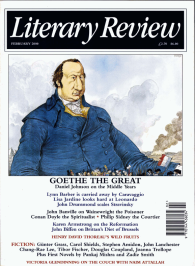Robert Nye
Too Many Pimples?
Philip Sidney: A Double Life
By Alan Stewart
Chatto & Windus 368pp £20
Sir Philip Sidney has always appealed to his fellow poets as the type of what a poet should be. Shelley called him ‘a spirit without spot’ and Browning called him ‘the starry paladin’. His legend bears comparison, in many respects, with that of Rupert Brooke.
He was born at Penshurst, in Kent, on 30 November 1554, of a noble family, and named after Philip II of Spain, his godfather. Educated at Shrewsbury and Christ Church, he came down prematurely from Oxford at the age of fourteen, without taking a degree, when his college was closed

Sign Up to our newsletter
Receive free articles, highlights from the archive, news, details of prizes, and much more.@Lit_Review
Follow Literary Review on Twitter
Twitter Feed
It wasn’t until 1825 that Pepys’s diary became available for the first time. How it was eventually decrypted and published is a story of subterfuge and duplicity.
Kate Loveman tells the tale.
Kate Loveman - Publishing Pepys
Kate Loveman: Publishing Pepys
literaryreview.co.uk
Arthur Christopher Benson was a pillar of the Edwardian establishment. He was supremely well connected. As his newly published diaries reveal, he was also riotously indiscreet.
Piers Brendon compares Benson’s journals to others from the 20th century.
Piers Brendon - Land of Dopes & Tories
Piers Brendon: Land of Dopes & Tories - The Benson Diaries: Selections from the Diary of Arthur Christopher Benson by Eamon Duffy & Ronald Hyam (edd)
literaryreview.co.uk
Of the siblings Gwen and Augustus John, it is Augustus who has commanded most attention from collectors and connoisseurs.
Was he really the finer artist, asks Tanya Harrod, or is it time Gwen emerged from her brother’s shadow?
Tanya Harrod - Cut from the Same Canvas
Tanya Harrod: Cut from the Same Canvas - Artists, Siblings, Visionaries: The Lives and Loves of Gwen and Augustus John by Judith Mackrell
literaryreview.co.uk